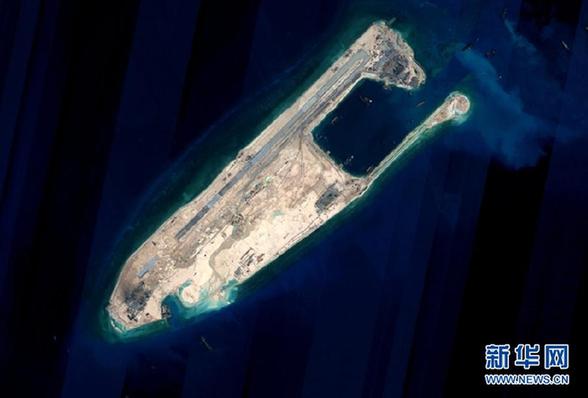 |
|
This satellite image released shows the Fiery Cross Reef where the reclamation project has been completed. [Photo/Xinhua] |
US Deputy Secretary of State Antony Blinken's irresponsible remarks on China's island reclamation projects in the South China Sea risks reviving tensions between Beijing and Washington after the two countries tried to ease them before last week's high-level China-US Strategic and Economic Dialogue.
On June 26, Blinken said China's island building projects are a "threat to peace and stability" and compared them to the Ukraine crisis, alleging that they are "unilaterally and coercively changing the status quo". Such remarks, made just two days after China and the United States concluded their annual S&ED which yielded multiple results, could cast a shadow over the larger and improving picture of China-US ties.
Yet Blinken's remarks are typical of Washington, which has seldom played an impartial role in the South China Sea issue. To pursue its interests and realize its strategic goals in the Asia-Pacific region, the world's sole superpower has tacitly backed countries like the Philippines to ratchet up tensions over the maritime disputes.
As far as the island building projects are concerned, Blinken should realize that it was countries such as the Philippines and Vietnam that had first changed the status quo in the South China Sea. Since the exploration for oil in the South China Sea started in the 1960s they have forcibly and illegally seized Chinese islands and islets and built many facilities, including those for their militaries, on them.
To consolidate their illegal occupation, these countries, with the covert and overt support of outside forces, the US in particular, have resorted to many tricks, including pretending to be small countries being bullied by a "big neighbor". China's island building projects in the South China Sea, which are its legitimate right, are just an excuse these countries are trying to use to confront China.
As a country that has repeatedly claimed to have a stake in Asia-Pacific's peace and stability, the US should adopt a neutral stance in the South China Sea disputes and stop confusing right with wrong. If US officials really care about peace and stability in the South China Sea, they should rein in their country's allies in the region - especially the Philippines and Japan - from making reckless moves that could raise tensions or even lead to a conflict.
Last week, Japanese and Philippine military aircraft twice flew close to the disputed Liyue Tan in the South China Sea during a joint military exercise near the disputed waters. The incident signaled the Philippines' efforts to get Japan's support in its disputes with China and Japan's intention to interfere in the South China Sea issue.
Tokyo is desperate to meddle in the South China Sea issue because it wants Beijing to divert resources from the East China Sea, where its dispute with China over the Diaoyu Islands shows no signs of abating. Both countries have also eyed for closer defense ties, especially in the field of security at the high seas. According to an AFP report, Manila was particularly keen on getting the P-3C Orion surveillance plane flown by Japanese pilots during last week's joint exercises near the disputed waters.
The latest reckless moves of the Philippines and Japan show they want to seize every opportunity to form a "united front" in their maritime disputes with China even at the cost of sacrificing regional peace and stability.
But the two countries' ulterior motives are doomed to failure because China is absolutely firm in its resolve to defend its maritime territorial integrity. No matter what tricks Manila and Tokyo resort to, China will never change its stance on the maritime disputes in the East and South China seas, simply because its claims are legitimate.
As a country that has nothing do with the South China Sea issue, Japan should be wise enough to keep away from it. Its provocative and confrontational moves will not help resolve the maritime dispute over the Diaoyu Islands; instead, they can lead to more confrontations.
The author is a senior writer with China Daily. wanghui@chinadaily.com.cn